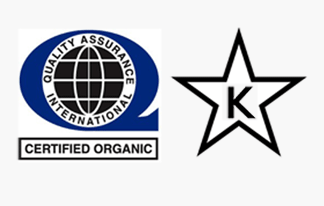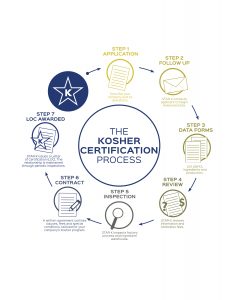
>Get Kosher Certified
What is certified kosher? STAR-K Kosher Food Certification is a guarantee that food products and ingredients meet all kosher requirements. This kosher certificate also authorizes the manufacturer to display the STAR-K emblem on the product to advertise its kosher status.
The procedure for acquiring kosher certification is relatively simple. Upon receipt of your application, a representative of STAR-K will evaluate your company’s ingredients and products. Then a contract will be drafted, detailing all the requirements and obligations of both parties. All kosher requirements, as well as a list of all your ingredients and products, will be enumerated. Furthermore, the contract will outline the correct emblem authorized for each product indicating each product’s Kosher status. A signed contract guarantees that regular visits will be made periodically by a Rabbinic field representative of the STAR-K. The purpose of the Rabbi’s visit is to monitor compliance with the terms of the agreement by checking ingredients, products, labels, etc.
Kosher certification requires a detailed study of:
a) all ingredients used in the plant,
b) the method of production, and
c) all products produced there.
STAR-K field representatives familiar with the food industry and ingredients will visit the plants. This completes the initial inspection phase of the certification process. These three subjects will be treated separately in the paragraphs below.
A. Ingredients
All ingredients in the plant, whether or not they are slated for kosher use, must be evaluated thoroughly. The use of ingredients on common equipment impacts upon the kosher status of all products produced. The ingredients must be identified and classified at two interface levels.
• Kosher and non-Kosher
• Pareve and Dairy
There is a group of raw materials that do not require formal kosher certification in order to be approved for kosher use. These are intrinsically kosher ingredients, such as cane sugar, corn meal, vanillin, and a host of others. These materials have been investigated and determined to be in compliance with kosher regulations. However, numerous other materials can only be approved for kosher use if formally kosher certified as such. This is usually done by a letter of kosher certification from a particular Rabbinic agency that designates the item as kosher. The letter of certification will indicate the pareve or dairy status of the product as well.
B. Plant Procedures
It is always important to review and analyze the details of production in order to grant kosher certification. If, for example, a non-kosher ingredient was processed on the equipment, the details of production such as temperatures or consistency are critical in order to determine proper techniques to return the equipment to a Kosher mode. Therefore, during the initial inspection it is important to determine the degree of heat used, the means of conveyance of ingredients or pre-mixes, and even packaging procedures, all of which may be relevant to Kosher certification.
C. Products
Each product that is to have a kosher food certification must be clearly marked with the correct Kosher symbol. This information must be updated on an ongoing basis in order to keep lists of certified products current. This up-to-date listing of all products is critical to both the STAR-K and the company. The STAR-K must have an accurate listing of all the products it certifies in order to service the consumers and companies requesting information about products bearing the STAR-K kosher symbol. Furthermore, a company does not want any product that is indeed certified as kosher, to be circulating in the marketplace without testimony to that certification.
As mentioned above, no new ingredient may be used in the plant without prior approval of STAR-K. Very often, mistaken claims may be made regarding the kosher status of a particular ingredient. If the ingredient is used without approval, it could compromise the kosher program. It is always advisable for a company to submit proposed ingredients to the STAR-K as soon as possible. Once Kosher approval is obtained for a new ingredient, it can be added to the approved list, and the company then has the choice of using it or not.
 Step 1 Application: Describe your company and its operations.
Step 1 Application: Describe your company and its operations.
Step 2 Follow Up: Star-K contacts applicant to begin review process.
Step 3 Data Forms: List plants, ingredients and production.
Step 4 Review: Star-K reviews information and estimates fees.
Step 5 Inspection: Star-K inspects factory process and ingredient warehouse.
Step 6 Contract: A written agreements outlines clauses, fees and special conditions, tailored for your company’s Kosher program.
Step 6 LOC Awarded: Star-K issues a Letter of Certification (LOC). The relationship is maintained through periodic inspections.
To request additional information on STAR-K kosher certification , fill out the form today!

 STAR-D
STAR-D STAR-S
STAR-S